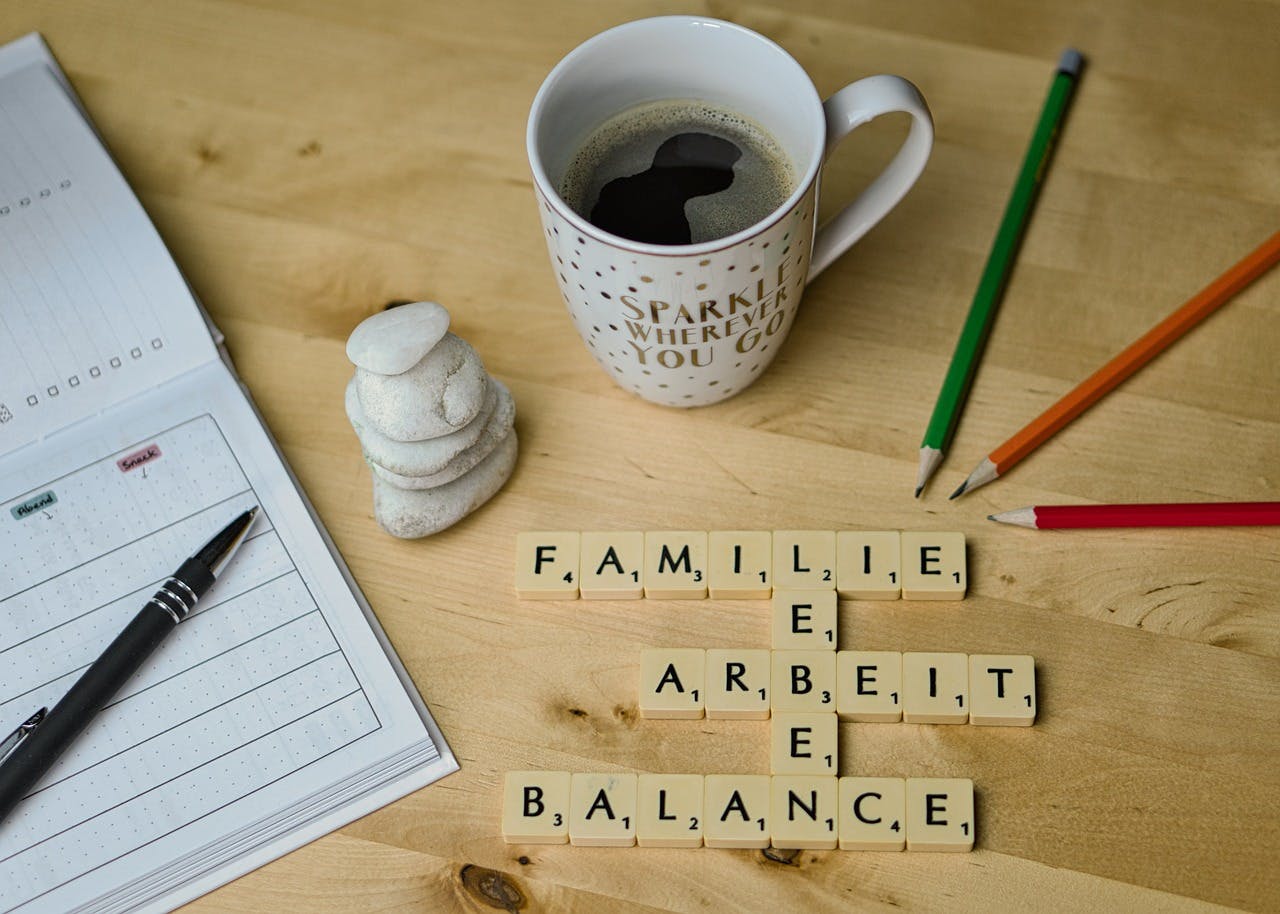Article
Understanding the Significance of Work-Life Balance
If you have worked anywhere in the past decade, you have probably heard the words work-life balance before. Maybe you have heard it at a training event, maybe you have seen it on a talk show, maybe you’ve googled it yourself.
It’s a term that has caught on. With the technological developments of recent years, people feel more than ever that our lives outside of work could be just as important as our lives at work.
But what exactly does work-life balance mean? What are the benefits? How can you achieve it? Read on to find out more.
What is Work-Life Balance?
The term "work-life balance" has its roots in the women’s liberation movement in the United Kingdom in the 1980s. At the time, the term was used to describe the need for flexible working hours and maternity leave for women.
Today, it refers to the need for a separation between our careers and our lives outside of them. It is a relatively new concept in the history of the modern workplace, and one that has become much more important in the last decade.
Simply put, if you have an excellent work-life balance, you have a job that allows you to have a fulfilling life outside of work and a life that allows you to advance in your career.
Why is Work-Life Balance Important?
Over the past 20 years, due to the nature of the world becoming more interconnected, the ability to leave work behind when you clock out has dramatically shifted. People are far more likely to check emails on the weekend or take work home with them now than at any other time in the past century. Mental health and overall satisfaction with life are also gaining more importance.
Because of this, having a good work-life balance has become incredibly important to employees, but it has also been discovered that it’s beneficial to employers.
The maintenance of a healthy work-life balance has also been shown to improve the productivity of your staff. If employees are satisfied in their current role and feel like they have a fulfilling life outside of the workplace, they, in turn, feel less like work is a ‘necessary evil’ they have to ‘put up with.’
To put it in the simplest terms, happy staff work harder, perform better, make fewer mistakes and create an excellent ‘united front’ for your company.
It has also been shown that businesses that encourage a healthy work-life balance tend to become attractive places to work, especially in a post ‘lockdown’ world. This is particularly important if a company is looking to secure and retain younger staff.
A 2019 study found that 49% of millennials were most likely going to quit their jobs in the next two years, which was directly related to work-life balance.
Hiring a new employee costs, on average, €35,000 (USD 41,000) and takes up to 28 weeks. So keeping all this in mind, it’s incredibly important for companies to keep their current employees happy and create environments that attract the best workers in the future.
What Are the Main Benefits of Work-Life Balance?
Especially after the Covid-19 pandemic dramatically altered the scope of how and, more specifically, where we work, the balance between our jobs and our personal lives has never been more important. But what are the benefits of an excellent work-life balance?
Less Stress
In the US alone, stress is linked to 6 of the leading causes of death, and up to 75% of visits to a doctor each year result from stress-induced illnesses. The bottom line is that, of course, there are healthy levels of stress in a job. Sometimes a little pressure can be a great motivator at times. However, if an employee is experiencing constant stress, they won’t be productive.
Improving work-life balance has been shown to reduce stress levels and create better job satisfaction. It also keeps employees healthy, which in turn makes them productive.

Improves Your Mental Health
Good mental health is essential for all people. One of the critical elements in maintaining good mental health is having the time and space to reflect and ‘check in’ with oneself.
In the UK, it’s estimated that 12.7% of all sick days taken annually can be linked to mental health issues. This doesn’t mean that all of these were caused by the workplace, but if employers can create environments and conditions that in turn improve the mental health of their staff, they’ll be sure to benefit from it in the long term.
When people are in a good state of mental health, they are better positioned to regulate their emotions. They are also more receptive to suggestions and criticism and are generally more productive.
Better Physical Health
By now, most of us know that regular exercise is a crucial pillar for long term health. It doesn’t mean that people should become gym junkies; it simply means that regular, consistent activity can reduce stress, lower blood pressure, reduce the risk of heart attack and stroke, and much more.
Most doctors agree that every adult should be getting at least 30 minutes of moderate exercise, four times a week. This seems like an achievable task, but one of the most significant barriers to getting regular exercise is time.
We’ve all been there; a deadline kept you at work late. You then came home and crashed straight into bed, setting your alarm for 6:30am so you could get a run in before going to work. Of course, you had every intention of doing it, but when the alarm went off, you instead hit snooze because sleep was more precious to you.
This lack of time is echoed throughout most of the developed world. When you don’t have a work-life balance, you begin sacrificing things in your personal life that you deem to be ‘non-essential.’ The problem with this is that exercise has benefits for work too.
A recent study showed that those who have a good work-life balance tend to exercise more. It also found that those who regularly exercise, tend to perform better at work than those who don’t.
They also usually become better at managing their work-life balance because the benefits they experience from regular exercise become incredibly important to them.

Proven to Improve Your Relationships
Relationships are vital for human beings. We all have an innate need to belong and spend most of our lives seeking that feeling in parallel with the careers we create. The problem is that our careers sometimes take away more time than we would normally spend on these relationships.
If you don’t have a work-life balance, you are more likely to resent people in your life who need things from you, like attention, support or time. In fact, when you are in a relationship with someone who is a ‘workaholic,’ you have twice the chance of divorcing.
Relationships take time and energy, both in and out of the workplace. Another recent side effect scientists are noticing is ‘Revenge Bedtime Procrastination.’ This is where a tired person refuses to go to bed until late. The psychological reasons behind this are varied, but often they are linked to an overwhelming feeling that you have no time for yourself.
If you have spent all your time and energy giving to your job, then to the relationships in your life, you might find there’s no time left over for you except when everyone else has gone to sleep. But, unfortunately, this is where sleep procrastination begins, and a vicious cycle can be created that will, in turn, negatively affect the relationships you have worked so hard to foster.
People who have a work-life balance tend to have better interpersonal relationships because they don’t feel that the time they spend with people is being taken from them.
Increases Engagement at Work
Generally speaking, when employees feel like they have some form of control over their work-life, they feel more engaged. When employees are given more flexibility in how they work or perform tasks helps them to be more focused.
When you show workers that you understand that they have lives outside of work and allow for the general ‘life happens’ things, like a sick child or even something as simple as a dentist appointment; you will find that they become more engaged in their tasks because they no longer have to worry about scheduling their life around working for you.

Supports Creative Thinking
We’ve often heard some of the greatest ideas people have had, came to them when they were in the shower, walking the dog, or on vacation. This is because to create, we usually need free and clear space to do so.
Stressed people find it hard to create anything. I’m sure most people can remember a time where they were trying to find an urgent solution to a problem at work.
You stress about what you can do to fix it, but no ideas come, then suddenly, after you have sat on the couch at home, the solution appears.
Improves Productivity
This is possibly one of the most straightforward points to explain. Countless studies have shown that happy staff complete tasks quickly and efficiently, with fewer mistakes.
In the modern world, the easiest path to staff happiness is through fostering a better work-life balance.
Supports Success and Brings Higher Levels of FulfilmentThere is a common misconception that you can’t have career success if you have a work-life balance. This comes from the idea that you can have a fulfilling career OR fulfilling personal life but not both; in reality, this isn’t the case.
The reality of having a great individual work-life balance is that you must create it for yourself on your own terms. Those who seek this kind of life goal tend to develop excellent organisational and problem-solving skills in their quest to achieve it.
As an employer, seeking staff who want a great work-life balance, and encouraging this within your company, will set you up to be surrounded by staff who are fulfilled and constantly seeking improvement both personally and professionally.
Tips to Improve Your Work-Life Balance
So you’ve seen the benefits of a good work-life balance, both as an employee and as an employer, but now what? How can you improve it? Unfortunately, it's not as simple as flipping a switch and saying that from now on your life and the lives of your employees must be equal parts work and life.
Of course, there are times when some "give and take" is required, but there are a few things you can keep in mind to create a better balance.
Encourage Time-Off
This is really about cultural change, and it has to start from the top. It can be as simple as encouraging employees to take their annual leave and use it. It can be as simple as having a conversation about "Where do you want to go on vacation this year?
There is often unspoken tension in the workplace about annual leave. Many employees worry about taking their vacation during a busy time, or they feel that they are not as dedicated as "Bob" from accounting, who has a thousand days of annual leave saved up because he hasn’t taken a vacation in years.
This is entirely Bob’s decision, but the company must be careful not to give the impression that Bob is being rewarded for not exercising his right as an employee. The fact that he never takes vacation may make him a fixture, but this should never be a deciding factor when it comes to things like a promotion or a raise.
When encouraging time off, employers need to lead by example, take a clear stance and set boundaries. Vacation, for example, means no work during this time.
This also applies to things as simple as the amount of time you are allowed to go home. If an employee’s contract states that they start at 9am and finish at 5pm, they should be allowed to do so without being judged or facing consequences.
Introduce Short Breaks Throughout the Working Day
Birthday’s in the office can be awesome, and we all know why. Firstly there’s cake, and secondly, the cake is typically eaten mid-morning or mid-afternoon. Everyone comes together and has a casual break for about 15 minutes.
Having breaks like this regularly can actually increase productivity, cohesion and strengthen the communication between departments. Someone from the tech team might not ever have the chance to ask someone in accounts what they’re working on, but during a break, everyone is equal.
Short breaks throughout the day also give people the chance to take care of things they might normally have taken a whole day off from work to do. Things like calling the bank can usually only be done during business hours, which unfortunately is when most of us are at work. Short breaks can help your staff to feel like working for you isn’t ‘getting in the way’ of their personal life.
Ask Employees For Guidance
The only people who know your employees’ needs the best are your employees. Finding out how to help them get the best out of work-life balance can be as simple as having a conversation about it. For example, you could include a section in their HR review about how they feel about their work-life balance and any suggestions they might have.
Including employees in the conversation is an additional way to show you appreciation but also strengthen loyalty between both parties and increase your company’s employee retention.
Different Generations Response to Work-Life Balance
If you have been on TikTok in the last year, you would know that never before in history have so many generations coexisted with the same level of influence. If you don’t know what TikTok is, you probably haven’t lost several hours staring at your phone on a Sunday afternoon instead of cleaning your apartment.
But how do the different generations feel about work-life balance? Does the generation you were born into dictate your attitudes towards it?

Millennials & Work-Life Balance
Even if you don’t know the other generations, you will have heard about Millennials. They’re the kids everyone loves to hate, except the fact is that the majority of them haven’t been kids for a really long time.
The millennial generation begins in 1981 and extends to the year 2000. They’re often tarnished with broad stereotypes, but it’s worth noting that this generation covers some of the most significant global transitions in modern history.
Millennials are perceived as entitled, emotional and fickle, but in reality, they are a generation crippled by debt who are, in many cases, never able to enter the housing market.
They often have a lot of emotional baggage that stems from the fact that their parents had stable careers, owned homes and had families before they were 30. Unfortunately, for many millennials, some of whom are 40, none of these will ever be a reality.
Higher education is one of the biggest priorities of this generation, and the benchmark for an entry-level position is constantly being shifted as more people enter the job market. Their parents were able to experience the ‘cinematic story’ of joining a company as a mail clerk with only a high school diploma, and retiring at C-Level.
For a millennial to do the same thing, they need a Bachelor’s degree (or in some cases a Masters), plus years of experience and the ability to work as an intern while paying off dramatic student loans and, most likely, still living with their parents well into their 20s.
Their story is complex, and for this reason, many companies struggle to attract millennial workers to join their teams.
A lot of companies go ‘wrong’ in trying to cater to millennials when they add ‘fun’ additions to the workplace like bean bags and ping pong tables. While these might, in fact, be fun, they don’t really address the needs of this generation.
To put it in the bluntest terms, millennials know that they might not achieve the things their parents did, so their personal lives are far more important to them than any generation before. They are less likely to strive towards a retirement plan because that reality is bleak for many of them.
The surest way to cater to millennials is to understand that they are far savvier than they are given credit for. They won’t stay in a position that’s unfulfilling for long, and that fulfilment must include a work-life balance.

Does Iceland Have a Good Work-Life Balance?
Iceland has the same main business principles as most developed nations. Their business culture is rich and fruitful, but a work-life balance has pretty high importance. In addition, family and social inclusion are incredibly important to Icelanders.
Icelandic people are incredibly hard working. A thousand years of hard work has taught them the value of a kroner, but work isn’t the only thing they live for. As a result, they tend to work more flexible hours, and typical workplaces in Iceland are more inclusive of people’s lives outside of the office.
Work-life balance is so important in Iceland that there has been a notable shift in backing practices and technologies about working smarter, not harder, in recent years.